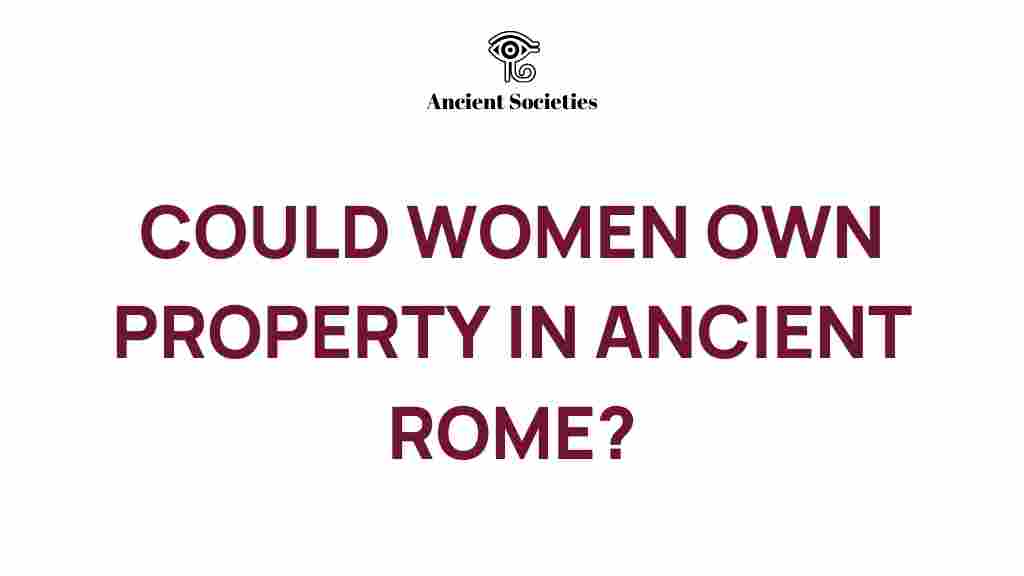Unveiling the Truth: Could Women Own Property in Ancient Rome?
The history of women’s rights in Ancient Rome is a fascinating tale that reveals much about societal norms, gender roles, and the legal status of women during that time. One of the most intriguing aspects of this history is the question of property ownership. Did women in Ancient Rome have the right to own property? This article delves into the evidence provided by archaeology and historical documents, exploring the complexities of women’s rights, property ownership, and the evolving views on gender roles in this ancient civilization.
The Legal Status of Women in Ancient Rome
To understand whether women could own property in Ancient Rome, we must first explore their legal status. The legal framework of Ancient Rome was complex and evolved over time. Women in Ancient Rome were generally considered to be under the authority of a male guardian, which significantly influenced their ability to engage in legal matters, including property ownership.
Patria Potestas and Women’s Guardianship
In Ancient Rome, the concept of patria potestas referred to the power held by a male head of a family over his household, including his children and wife. This system dictated that women were often under the guardianship of their fathers or husbands, limiting their autonomy. However, there were exceptions:
- Women of the upper classes: Wealthy women sometimes had more influence and were able to manage their own properties, especially if they were widowed.
- Legal exceptions: Certain legal arrangements allowed women to own property in their own right, particularly through dowries or inheritance.
Property Ownership: The Evidence
Archaeological findings and historical texts provide valuable insights into women’s property ownership in Ancient Rome. While the general rule favored male ownership, the reality was more nuanced.
- Dowries: Women often brought dowries into marriage, which could include land and property. In some cases, this property remained under their control.
- Inheritance rights: Women could inherit property from their fathers, especially if there were no male heirs. This right varied by social class and the specific legal arrangements in place.
- Business and property management: Some women managed their own businesses and properties, particularly in urban settings, indicating a level of independence.
The Role of Feminism in Understanding Women’s Rights
Modern feminism provides a lens through which we can examine women’s rights in Ancient Rome. While women faced significant legal limitations, the notion of property ownership was not entirely absent. Feminist scholars argue that understanding the past is crucial for recognizing the progress made in women’s rights today.
Historical Context and Societal Norms
The societal norms of Ancient Rome were rooted in a patriarchal system, yet women found ways to navigate these constraints. Historical records show that some women wielded considerable influence:
- Influential women: Figures like Livia Drusilla, the wife of Augustus, played significant roles in politics and society, challenging traditional gender roles.
- Women in business: Evidence indicates that women engaged in various trades, sometimes owning property related to their businesses.
Step-by-Step Process: How Women Acquired Property
Understanding how women could acquire property in Ancient Rome involves examining several key processes:
1. Marriage and Dowries
When women married, they often brought a dowry, which was a significant sum of property or money. This dowry could include:
- Land
- Money
- Household goods
The dowry was intended to support the couple and could sometimes remain under the woman’s control, even after marriage.
2. Inheritance
Women could inherit property from their family, particularly if they were the only heirs. Inheritance laws allowed for:
- Property transfer to daughters
- Bequests in wills
3. Legal Contracts and Agreements
Women could enter into legal contracts, especially in later periods of Ancient Rome. This included:
- Buying and selling property
- Entering into partnerships
4. Managing Property
Women who owned property could manage it, which included:
- Renting out land
- Engaging in trade
- Employing labor
Troubleshooting Tips: Common Misconceptions
Several misconceptions exist about women’s rights and property ownership in Ancient Rome. Here are some common issues and clarifications:
Misconception 1: Women Couldn’t Own Anything
While it is true that women faced many restrictions, evidence shows that many could and did own property, particularly in the form of dowries and inheritances.
Misconception 2: All Women Were Completely Dependent on Men
Although many women were under a male guardian, some navigated these restrictions and gained autonomy through property ownership and business management.
Misconception 3: Property Ownership Was Uncommon
Archaeological findings indicate that women owning property was more common than previously thought, particularly among the elite and in urban settings.
Conclusion: A Complex Legacy
The question of whether women could own property in Ancient Rome unveils a complex legacy of women’s rights and societal norms. While the legal status of women was often restrictive, evidence suggests that many women found ways to assert their rights and manage property. Understanding this history is essential for recognizing the progress made in feminism and women’s rights today.
As we continue to explore the past, we must appreciate the resilience of women who navigated the challenges of their time. The archaeology of Ancient Rome provides us with valuable insights, reminding us that the struggle for equality has deep historical roots.
To learn more about the impact of women’s roles in ancient societies, visit this educational resource. For further reading on the subject of women’s rights throughout history, check out this link.
This article is in the category History and created by AncientSocieties Team
